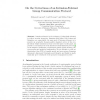98 search results - page 15 / 20 » Certificateless Authenticated Two-Party Key Agreement Protoc... |
ACISP
2010
Springer
13 years 9 months ago
2010
Springer
To reduce the damage of phishing and spyware attacks, banks, governments, and other security-sensitive industries are deploying one-time password systems, where users have many pa...
STOC
1999
ACM
13 years 11 months ago
1999
ACM
Oblivious polynomial evaluation is a protocol involving two parties, a sender whose input is a polynomial P, and a receiver whose input is a value α. At the end of the protocol t...
CRYPTO
2006
Springer
13 years 11 months ago
2006
Springer
In a seminal paper, Feldman and Micali (STOC '88) show an n-party Byzantine agreement protocol tolerating t < n/3 malicious parties that runs in expected constant rounds. H...
CHARME
2003
Springer
14 years 19 days ago
2003
Springer
Intrusion-tolerance is the technique of using fault-tolerance to achieve security properties. Assuming that faults, both benign and Byzantine, are unavoidable, the main goal of Int...
DAM
2006
13 years 7 months ago
2006
Abstract. Artin's braid groups currently provide a promising background for cryptographical applications, since the first cryptosystems using braids were introduced in [2, 3, ...


